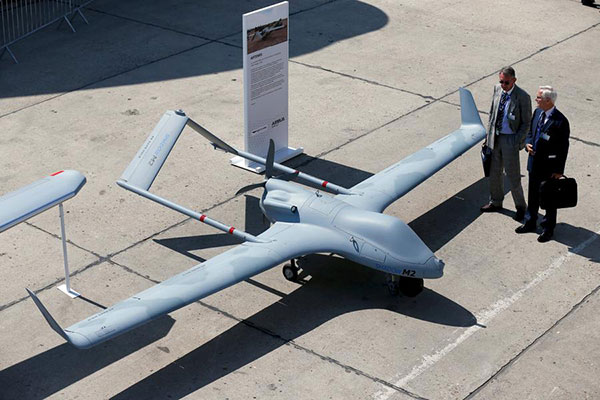Super computer exports restricted
By Gao Yuan (China Daily) Updated: 2015-08-01 08:56
 |
|
Visitors look at a military drone on display during the 51st Paris Air Show at Le Bourget airport near Paris June 17, 2015.[Photo/Agencies] |
China will ban exports of high-performance drones and computers due to national security reasons, trade and customs authorities said on Friday.
The ban, which will be effective from mid-August, urges manufacturers not to export drones that are capable of flying in gusty winds, hovering above 15,420 meters and having more than an hour of flight duration.
Computers with greater than 8 tera floating-point operations per second will also not be allowed for exports, said an announcement jointly issued by the Ministry of Commerce and the General Administration of Customs. It is the first time that China is imposing export restrictions on such products.
The authorities did not explain how the devices are a threat to national security in the short announcement. However, the decision will have limited impact on export of commercial drones, industry insiders said.
"The ban is targeting drones not designed for commercial use and will protect key technologies of Chinese companies," said Shao Jianhuo, vice-president of DJI Technology Co, a Guangdong-based company that controls about 70 percent of the global drone sales.
None of the DJI products will be banned, the company said after a review of the standards.
"It was a surprise decision for the industry, but it really makes sense in terms of national security and the healthy growth of the industry," Shao said.
The ban came two weeks after a drone likely made by a Chinese company was caught in international crossfire.
On July 15, Pakistan said it had shot down a spy drone owned by Indian military in the border area of the two nations while India dismissed the accusation. The flying object looked like a China-made product in shape.
The ban over super computers also makes sense, said Gene Cao, a senior information technology analyst at market research firm Forrester Research Inc.
"I think it definitely proves that China has the world's leading capabilities on super computing," he said.
China's rapid growth in the super computing sector has already raised eyebrows in nations like the United States, said experts.
The US government banned processors used in Chinese supercomputers some months ago, citing information security concerns. The move hurt Intel Corp's business with a number of labs and universities.
China is one of the world's largest makers of super computers. China-based Tianhe series is already the world's fastest supercomputer. The US and Japan are also investing on building the next-generation of supercomputers to leapfrog the Tianhe.
- 2015 China International Fair for Investment and Trade kicks off in Xiamen
- China's commodity imports robust in Jan-Aug period
- China stocks rebound 2.92%
- 2015 China box office already past 2014 total
- China foreign trade decline widens in August
- Interview: JP Morgan's senior executive bullish on China
- Innovation, development the focus for NZ mayors
- Lives of freelancers

















